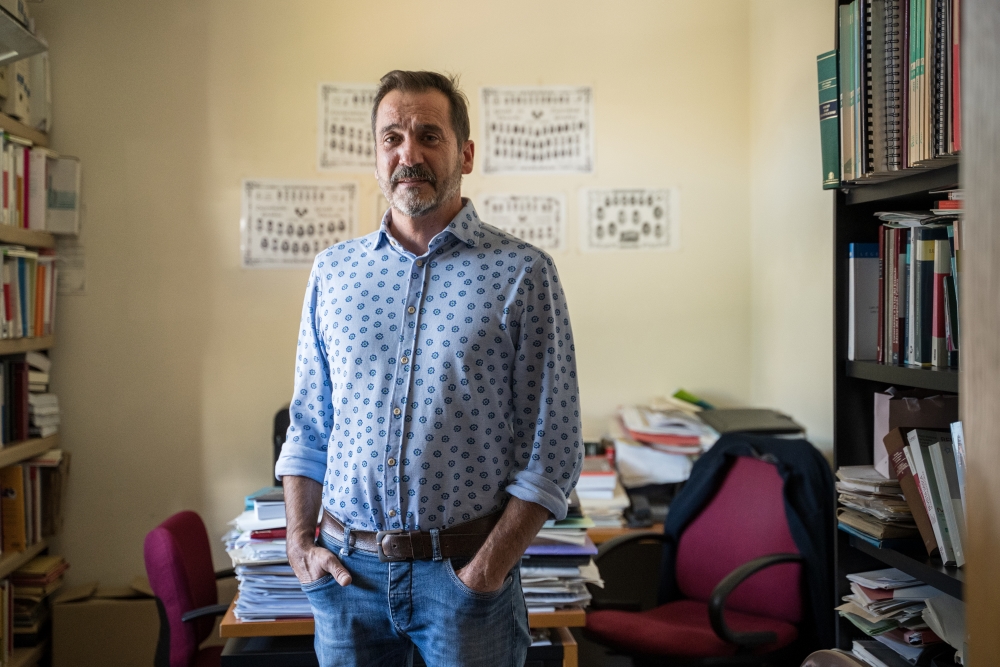"To reduce new virus outbreaks, food production needs to be radically changed"
- Rob Wallace is an American evolutionary biologist who has been investigating the pandemic for 25 years. In the interview they gave him in the magazine Marx 21, he explains what generate pandemics such as coronavirus: industrial food production. If we do not want more in the future, it has pointed to the need to change the food production model.

Rob Wallace is an evolutionary biologist who works for public health in the United States. He has researched the new pandemics for 25 years and in this article of the Nearby Net of Pello Zubiria you will read his thesis on the coronavirus. This interview was carried out in the magazine Marx 21 and has since been translated by various media soberaniaalimentaria.info and directa.cat. In this summary we have translated passages on feeding:
For years you have been researching epidemics and their causes. In the book Big Farms Make Big Flu you've looked at the relationships between industrial farming practices, organic farming and the epidemiology of viruses. What's your vision?
"The increase in the incidence of viruses is directly related to food production and the profitability of multinational companies"
The real risk of each outbreak is not understanding that another COVID19 is not an isolated case. The increase in the incidence of viruses is directly related to food production and the profitability of multinational companies. Anyone who wants to understand why viruses are becoming more dangerous must investigate the industrial model of agriculture and, more specifically, livestock production. Today, there are few governments and scientists willing to do so. On the contrary: when new outbreaks emerge, governments, the media and most medical organizations are so focused on responding to emergencies on an individual basis, forgetting the structural causes that turn multiple and marginal pathogens into an unexpected global phenomenon.
Who is responsible?
I mentioned industrial agriculture, but the approach is broader. Capital conquers land to the last primary forests and to small agricultural productions all over the world. These investments favor deforestation and a type of development that generates disease. The functional and complex diversity that make up these large areas of land is equated and pathogens, which were previously closed, extend to local livestock and human communities. In short, the centers of world capital, such as London, New York, Hong Kong, are the main outbreaks of disease.
"The centers of the world capital should be considered as the main source of outbreaks of disease"
What diseases have spread this way?
Currently, there is no pathogen outside the influence of capital. The most remote places are also affected. Ebola, Zika, coronavirus, the resurgence of yellow fever, African fever of many pigs with avian influenza are some examples of this: these pathogens leave an inner corner on the shores of the village, then to the cities of the territory and, finally, to the global travel network. There are only a few weeks left of the Congolese bats, believed to be transmitting Ebola, and of the bathers that this virus kills in Miami.
What role do multinational companies play in this process?
Planet Earth is today a large industrial agricultural factory, largely from the point of view of both biomass and land use. The aim of the agro-industry is to monopolise the food market. The neoliberal project is designed to help the most developed industrialized countries steal their lands and resources from the most vulnerable countries. The conclusion is that many of these new pathogens that were previously associated with forest ecosystems and that developed over long periods of time are being released and pose a threat to the whole world.
What are the consequences of agro-industrial production methods?
Agriculture, organized according to the needs of capitalism and which represents natural ecology, offers the concrete conditions that a pathogen needs to develop the most aggressive and polluting phenotypes. You couldn't design a better system to create deadly diseases.
What's that like?
"The spread of genetic monocultures from farm animals removes any immune barrier"
The spread of genetic monocultures in farm animals removes any immune barrier capable of slowing or slowing down transmission. The large dimensions and the high densities of the population favor a higher infection rate. These overcrowding suppresses the animals' immune response. The high yield of animals is the immovable basis of any industrial production, allowing viruses to constantly grow in new animals, which causes the force of viruses. In other words, agroindustry is focused on profits and it seems that the use of a virus that can kill a billion people offsets the risk.
How? !
These companies allocate the costs of their operations with epidemic risk to everyone else: animals, consumers, farmers, local communities and governments everywhere. The damage is so great that the agro-industry would end as we know it today if we added those costs to the business account. No company could bear the cost of this damage.
What would be the sustainable solutions to fight infectious diseases?
"To reduce new virus outbreaks, food production needs to be radically changed"
To reduce new virus outbreaks, food production needs to be radically changed. Farmers' autonomy and a strong public sector can reduce uncontrolled infections and unilateral contamination chains. This involves promoting biodiversity in livestock and crops and strengthening them strategically, both on each farm and at the territorial level. Feeding animals should be allowed to reproduce locally for the transmission of immunity mechanisms. Fair production must be combined with equal movement of goods. This requires subsidies for organic farming, as well as selling prices, and programmes for consumers. These projects must be protected against the constraints imposed by the liberal economy on individuals and communities, and must be defended against the oppression of the State headed by capital.
What should the left ask now that disease outbreaks are on the rise?
"Agroindustry has to be abolished forever, by public health"
Agro-industry, as a form of social reproduction, has to be abolished forever, if only for public health. The production of highly industrialized food is subject to practices that threaten all mankind, and in this case helps to release a new deadly pandemic.
We should call for the socialisation of food systems so that they cannot develop these dangerous pathogens. To achieve this, food production must be reintegrated into the needs of agricultural communities. This will require, first of all, the implementation of agro-ecological practices that protect the environment and farmers. The big picture is that we need to heal the metabolic gap that sets our ecology apart from our economy. To sum up, we have a world to win.
Horren arabera, datorren astelehenetik aurrera, orain arte COVID-19ari aurre egiteko neurriak bertan behera geratuko dira Eusko Jaurlaritzaren eskumeneko alorretan. Labi bera ere desegin egingo dute.
That's the summer that we have, and with it the holidays that we usually link to this season, as if they were a reward to everything that has been given throughout the year. And again people want to go away. He wants to be on the famous coast, marvelous nature or the world's... [+]






















